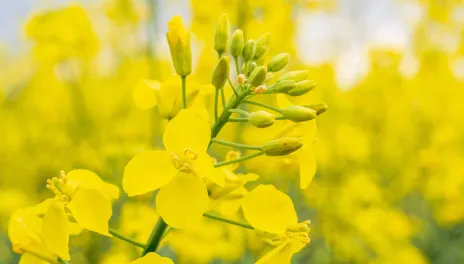NDSU Research at the LREC Seeks New Solutions for Canola Flea Beetle Resistance
North Dakota ranks No. 1 in the production of canola, growing about 80% of the canola produced in the U.S. Early in the growing season, farmers growing canola are on the lookout for damage from the canola flea beetle, the most serious early season insect pest threatens the survival and establishment of the crop.
Adult canola flea beetles overwinter in the leaf litter of shelterbelts or grassy areas and emerge in the spring. The major crop injury usually occurs in the first two weeks after the crop emerges.
Historically, farmers relied on neonicotinoid seed treatments to manage flea beetles. However, in recent years, farmers have noted that these treatments were beginning to be ineffective.
“We had very few options for treating canola flea beetles, and farmers had to rely on one mode of action,” explains Anitha Chirumamilla, Extension cropping systems specialist at the NDSU Langdon Research Extension Center (LREC). “When we started to see resistance to this treatment, we were losing our only tool for managing flea beetles.”
In order to prevent resistance issues, farmers need to have multiple modes of action available to them, so NDSU began a multi-year seed treatment efficacy study at the LREC and sites near Fargo to compare existing and new insecticide products.
“By varying the mode of action, farmers are exposing the flea beetles to new or multiple modes of action, making it harder for them to develop resistance,” says Chirumamilla. “When seed treatments are effective, farmers might save the added expense of needing to apply a foliar treatment later in the season.”
Chirumamilla led efforts to share recommendations with farmers across the region last summer. This summer, she will continue partnering with other NDSU researchers across the state to evaluate which seed and foliar treatments are the most effective and economical for controlling canola flea beetles.
FOR MORE INFORMATION:
NDSU Extension Publication – Scouting and Treating Canola Flea Beetle
Anitha Chirumamilla, 701-256-2582, anitha.chirumamilla@ndsu.edu
